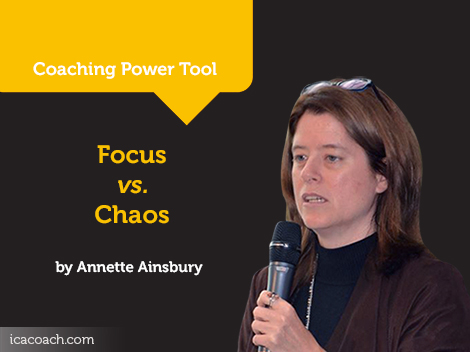 A Coaching Power Tool Created by Annette Ainsbury
A Coaching Power Tool Created by Annette Ainsbury
(Life Coach, CANADA)
Focus
Chaos
Case Study
Joe is a Director of IT. He’s been in his position for over five years and has worked for his current organization for more than 15 years. Joe has pursued various development opportunities throughout his career but they do not seen to be leading to a common goal. At his last performance review, his manager (the CTO) asked him what his career goals were and what motivated him. Joe was uncertain and told his boss that for now he was happy doing what he was doing. While Joe stated that he was happy where he was, his behavior was indicating otherwise (low engagement, participating in various but unrelated development opportunities, etc.). Joe’s boss asked him to consider where he felt he needed to grow and encouraged him to consider whether he eventually wanted the CTO position. He hired a coach to work with Joe to help him better define his future and how he was going to get there.
Joe has had three coaching sessions so far with a corporate coach. He finds his weekly sessions cathartic – it’s a relief to share work challenges with someone in confidence and where there is no judgement. However, he knows the intention is to help him grow and develop at work and he is unclear as to how these sessions are helping him do so. He doesn’t say anything to his boss, however, because he’s enjoying the opportunity to share openly with someone.
Meanwhile, Joe’s coach (Rebecca) is frustrated. While Joe is engaged at each session and is happy to be a part of the process, he resists setting goals for himself. Rebecca wants to continue to be supportive of Joe’s current challenges but knows that the nature of her support needs to change in order for Joe to move into action.
So where do Joe and Rebecca go from here? Let’s explore.
Self-application
Choosing focus over chaos is not just applicable to coaching but to most aspects of our life. In order to “achieve”, “move forward”, “move beyond”, “grow”, “develop” or whatever we have defined as our objective, we are faced with the choice between focus and chaos. Focus is the direct route to success. Chaos is the windy, uncharted road that may or may not get us to our destination.
But it is a choice. Some people thrive on Chaos and not only struggle with Focus but feel confined by it. So the first step is to determine how direct you want your route to be. The more direct your route (i.e. the more focused you are) the quicker the results and the more likely you are to arrive at your desired end point.
Once you/your client have chosen Focus over Chaos, there is still plenty of work to be done before moving into action.
In our case study, Rebecca is frustrated by Joe’s “choice” to stay in the Chaos state – but is it an overt choice or an unconscious one? In the next section, we explore how Rebecca can help clarify whether this is a conscious choice and whether it is the right one for Joe.
Coaching Application
As coaches we can’t choose Focus over Chaos for our clients, but we can clarify the choice and help them move from one to the other if they wish. Active listening, observation and exploration of underlying beliefs are all great tools a coach can use to help a client understand the choices before them.
Let’s go back to Joe and Rebeca. At this stage of the coaching, Rebecca could perhaps summarize back for Joe the various topics they have been discussing and observe that at first glance, they don’t seem tied to his stated goal. She then might confirm whether his goal to create a career plan continues to be important, and clarify how their conversations moving forward might best help him achieve his goal. Rebecca might also ask Joe why he feels their conversations have been more focused on his current work challenges than on future growth opportunities – perhaps there are some underlying beliefs that need to be explored in order for Joe to move forward.
Assuming Joe openly chooses the Focus path, Rebecca can again draw on the active listening and observation tools to help Joe stay on track.
Reflection
Modeling the behavior that will benefit our clients in achieving their goals is critical for coaches.
- Do you choose Focus over Chaos in your life and in your coaching practice?
- What impact does your choice have on your clients?
- If you don’t have the Focus you would like, how do you get there?
- If your client is struggling between Chaos and Focus, what can you do to help?